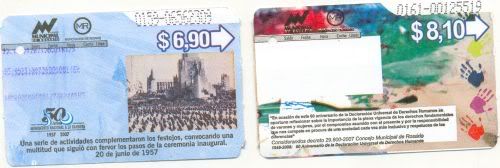
The above are prepaid cards of the kind used by urban buses in Rosario, worth 6 trips each. The one on the left shows the price of the bus ticket until yesterday (AR$1.20, discounted to 1.15 in 6-trip cards); the one on the right has the current price today, December 26 (AR$1.40, discounted to AR$1.35).
The reasons for the increase are (again) easily summarized: 1) inflation, affecting fuel, other supplies and general maintenance of the buses, as well as administrative expenses, etc.; 2) the mob that passes for a bus driver union got them a salary that rivals that of a well-established doctor, lawyer or architect; 3) the national government sends most fuel oil subsidies (keeping fuel oil cheap for public transportation) to Buenos Aires and its metropolitan area. Reason #1 finds the government simply in denial; reason #2 is fait accompli time and time again; reason #3 is a result of a federal republic that is such only on paper.
Just after Maurice the Menace was elected Chief of Government of BA, Néstor Kirchner ordered AR$600 million in subsidies to public transportation taken away from the capital district, but not in order to redistribute them among the provinces. Buenos Aires City, holding the highest standard of living in Argentina, and amid a shortage of fuel and energy everywhere, somehow continues to enjoy ridiculous cheap bus, train and subway fees.













So what do you expect from this government? If they were progressive they would increase the transport subsidies, or make it free. Then they would insist on vehicle pollution / noise controls. Of course that is not likely to happen in Argentina. People will just have to pay higher fares and put up with outrageous noise and pollution levels. Inflation is going to continue its steep climb, with the middle class ever shrinking. Prices for many goods are already much higher than in the US (take a look at household goods, furniture, most clothes - and factor into this that there are no real sales as in the US). The supermarket has already exceeded US prices in quite a few areas with quality and variety often substantially inferior in Argentina. On a recent visit to the US I was stunned to see PRESIDENT dairy products imported from France to Argentina for sale in the US at almost half the Argentine price. I found high quality beef (in this case roast beef, a cut that I find far better in the US than in Argentina) for $4,99 a pound. The government of ARgentina seems hell bent on making life a constant struggle for the Argentine people and, sadly, few Argentines have any idea of how much easier life is in other countries like the US. It doesn't have to be that way in Argentina but it will go on that way - probably indefinitely since the Argentine people are willing to tolerate just about anything. I am sure that some of your bloggers will dispute everything I have said but it's my experience that ALL the Argentines I know who have a good education and have travelled are in agreement with most, if not all, of my points (pride might keep them from admitting that American beef can be better, especially more tender, than many cuts of Argentine beef!)
ReplyDeleteWhat’s even more stunning is the difference in prices of Chinese-made goods imported into both the US and Argentina. I’ve found identical items for sale that are five times more expensive in Argentina than in the US. Not all of this difference can be ascribed to Argentine import taxes. I noticed in the last six months that some Chinese-made wire shelves increased from AR$140 to $180 then $200 at an Easy home improvement store, during which time the ARS/RMB/USD exchange rate was relatively constant. I can buy a similar shelf in the US for US$25.
ReplyDeleteJohn
I meant to reply to this earlier... To the very first question: "So what do you expect from this government?", regarding transport, I'd expect subsidies to be granted abundantly and fairly to all districts, because the bus is how millions of low-income workers move around each day, and because a bus is much more fuel-efficient than a private car (your own, or a taxi). Fair distribution of public transport subsidies should take into account the demographic importance of the district and its socioeconomic status. Buenos Aires City residents are more affluent than most, they have alternative means of transportation (bus and subway) and they've enjoyed other privileges over the provinces long enough.
ReplyDeleteAbout the rest of what Anonymous and John said, I can only guess that Argentinians don't have any idea how a free market works. We have no idea what the real inflation rate is, or the real cost of energy. Prices are set by speculators and by shop owners with no knowledge of business practices, and no-one calls them into account.
You know I'm not a laissez-faire supporter, but I think we should first have some experience with a real laissez-faire market and then "correct" the market when it's socially convenient (for example, with subsidies and tax exemptions for public transport, medicines, basic food items...). Instead we have a laissez-faire market in the crudest sense, with uninformed consumers and also uninformed sellers, who will set and accept any price for anything as long as the item is sold.